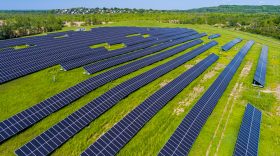Far-left environmental activists and far-right small government conservatives may seem like odd allies, but when it comes to making Florida a leader in solar energy, both sides agree. The time has come to open the market to solar power.
California, Texas and Florida have a lot in common. They are the nations three most populated states. All three enjoy warm, sunny climates. All three have perfect conditions for producing massive amounts of solar power. However, Florida lags far behind the other two mega-states in solar electricity production. Why?
“Florida is the best solar market in the eastern United States, and it’s clearly underperforming,” said Stephen Smith, executive director of the Southern Alliance for Clean Energy, which is part of a coalition of groups called Floridians for Solar Choice.
Florida is one of only five states in the United States that by law expressly denies citizens and businesses the freedom to buy solar power electricity directly from someone other than a monopoly electric utility. Now, Floridians for Solar Choice is working to place a question on the 2016 general election ballot asking voters to decide on expanding solar choice to Florida’s families and businesses. The ballot initiative would remove a barrier that currently blocks clean, renewable solar power.
One of the remarkable things about Floridians for Solar Choice is the diversity of its membership. According to In a recent poll, 74% of Florida voters said they would support a proposal to change Florida’s current law and allow Floridians to contract directly with solar companies to power their homes or businesses with solar energy, and the makeup of Floridians for Solar Choice reflects that broad base of support. The impressive list of supporters of Floridians for Solar Choice includes such diverse groups as the Christian Coalition of America, Conservatives for Energy Freedom, Florida Alliance for Renewable Energy, Florida Retail Federation, Florida Solar Energy Industries Association, Libertarian Party of Florida, Republican Liberty Caucus of Florida, Republican Liberty Caucus of Tampa Bay, Southern Alliance for Clean Energy, WTEC, Clean Water Action, Environment Florida, Evangelical Environmental Network, Greenpeace USA, IDEAS for Us, Physicians for Social Responsibility, Florida, ReThink Energy Florida, Sierra Club Florida and The Tea Party Network.
According to a recent article on The Wall Street Journal “…Utilities have long argued that customers should go through them for solar energy because they should help pay for the cost of maintaining the grid, which they still rely on for at least part of the day.”
Sterling Ivey, a spokesman for Duke Energy Florida, which provides electricity in the central and northern part of the state, said the company was committed to working with lawmakers “to achieve energy policies, incorporating solar, that are fair and beneficial to all of our customers.”
As with the wind power industry before solar, many state-sanctioned monopoly utility providers have attempted to hold independent renewable energy generators at bay until the cost of solar production drops to the point at which it is profitable for them to jump in to the market. Now, utility companies like Duke Energy are looking to develop “Community Solar” projects. These “Solar Farms” do offer customers the option of buying clean energy and offsetting dirty coal powered generation, but without the personal and local economic benefits of rooftop solar. In addition, utility-scale solar continues reliance on an aging transmission and distribution system.
“What’s happening now in Florida is really blocking the free market,” said Tory Perfetti, state director of Conservatives for Energy Freedom. Meanwhile, activists in Georgia, Utah, Colorado and Iowa have all recently fought to open up their states electricity market to third party power providers.
Solar growth in states that allow third party power purchase agreement, particularly in the form of solar leases, illustrates clearly that the inability of Floridians to purchase solar power electricity directly from someone other than a monopoly electric utility is one of the major reasons that Florida’s Solar industry has not taken off. In California, for instance, solar installations skyrocketed with the implementation of solar lease agreements. According to a 2013 report from the Climate Policy Initiative:

“Recently, steep solar panel cost reductions as well as strong federal and state policy supports have helped to catalyze substantial growth in rooftop solar PV deployment in California. Interestingly, this growth has happened in the face of declining financial incentives for solar installations at the state level through the California Solar Initiative. This growth has also been accompanied by a shift in market demand: Most homeowners in California are no longer purchasing the panels on their rooftops, they are leasing them. Over 75% of California’s new residential solar systems in 2012 were leased as compared to less than 10% in 2007.”
The fact that solar installations in California went up “in the face of declining financial incentives” is key to the successful alliance of far-right and far left in Georgia, and now in Florida. $0 up-front costs make installation a no-brainer for many people who want to make the jump to solar with little or no additional cost. Small-government, anti-tax conservatives like the “no government incentives” aspect of third party leases, and see it as a free-market solution which provides the individual with more energy independence. They are not required to agree with their environmentalist allies’ carbon-reduction goals or desire to reduce the effects of anthropogenic climate change.
Debbie Dooley, of the Georgia Tea Party and the Green Tea coalition stated the position clearly in an essay she wrote for Grist:
“The premise is simple: Those who believe in the free market need to reexamine the way our country produces energy. Giant utility monopolies deserve at least some competition, and consumers should have a choice. It’s just that simple, and it’s consistent with the free-market principles that have been a core value of the Tea Party since we began in 2009.”
Could the far-right and far-left find common ground on other issues? With the increased influence of corporate money in politics and the increase in government surveillance of citizens, it is within the realm of possibility that we may see these groups reunite again in the future over issues.





